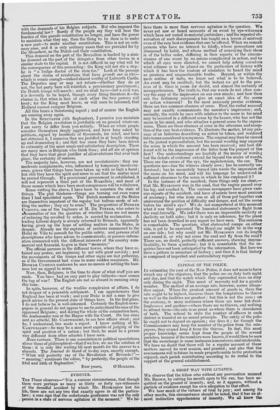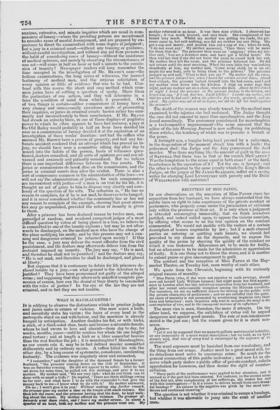A SHORT WAY WITH LUNATICS.
WE observe that the fellow who without any provocation maimed Mr. BROWN, by cutting his mouth open to the ear, has been ac- quitted on the ground of insanity, and, as it appears, without a particle of evidence except his own allegation to that effect. We hear much of the virtues of trial by jury ; and among its other merits, this circumstance should be noted, that it has an al- most instinctive apprehension of insanity. We all know the anxious, extensive, and minute inquiries which are usual in com- missions of lunacy—where the presiding persons are accustomed to consider cases of mental derangement, and are prepared by ex- perience to direct the examination with some degree of judgment ; but a jury in a criminal court—without any training or guidance, without careful investigation, and without any aid from persons in the habit of considering cases of lunacy—without the assistance of medical opinions, and merely by observing the circumstances of one act—will come in half an hour or half a minute to the conclu- sion of insanity ! Newspaper readers will long remember the time occupied in the investigation of Mr. BRANDS case—the tedious examinations, the long series of witnesses, the learned testimony of medical men, and the anxious solicitation of every opinion or tittle of evidence that was to be had. Con- trast with this course the short and easy method which com- mon juries have of settling a question of sanity. Show them the particulars of one action, and they will determine in a trice the condition of mind from which it proceeded. One of two things is certain—either commissions of lunacy have a very clumsy and unnecessarily circuitous mode of prosecuting their inquiries, or juries in criminal courts hasten rather too sum- marily and inconsiderately to their conclusions. If Mr. BRAND had struck an unlucky blow, in one of those displays of pugilistic power to which he often appears to have had recourse, ajury at the Old Bailey would probably in half an hour have decided his case as a commission of lunacy decided it at the expiration of an investigation of three weeks' duration : and had the ruffian who maimed Mr. BROWN been a person of property, and had any for- tunate accident rendered that an attempt which has proved an in- jury, we should have seen a committee sitting day after day to search into the habits of the person, hosts of witnesses ques- tioned, doctors consulted, and all sorts of opinions pro and con ad- vanced and anxiously and patiently considered. But we believe there is one important difference between the two courts. The juries or commissions de tuna. dine on the commissions, and the juries in criminal courts dine after the verdict. There is also a sort of compromise common in the administration of the laws—we will not say the administration of justice, for such compromises inconsistent nconsistent with justice—if a man is on trial for his life, it is thought an act of grace to him to dispose very shortly and care- lessly of the question of his wits. The reflection is, " He has no reason to complain, for if he is got mad, he deserves to be hanged; and it is never considered whether the community has or has not any reason to complain of the example, showing that great atroci- ties may go unpunished, provided the colour of insanity is given to them.
After a prisoner has been declared insane by twelve men, em- pannelled at random, and rendered competent judges of a most difficult question by virtue of being placed in a box, we believe he is committed to one of the lunatic asylums ; but may he not after- wards be discharged, on the medical men who have the charge of the place certifying his sanity, and by this process may not a cun- ning and dangerous criminal be returned upon society? If this be the case, a jury may deliver the worst offender from the civil punishment, and the doctors may afterwards deliver him from the restraint imposed on insanity. The jury may say, "He is mad, andtherefore he shall not be punished ;" and the doctors may say, "He is not mad, and therefore he shall be discharged, and placed at liberty." But suppose that it is customary to detain for life prisoners de- clared lunatic by a jury,—on what ground is the detention to be justified? They have been pronounced not guilty of the alleged crime; and supposing that they afterwards manifest complete pos- session of reason, how can the denial of their liberty be reconciled with the rules of justice? In the eye of the law they are not criminal, and in fact they are not lunatic.



























 Previous page
Previous page